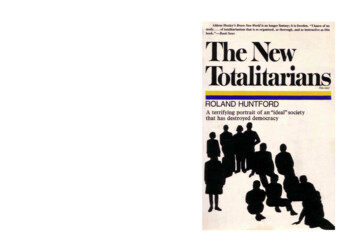
Transcription
The New TotalitariansThis book is a warning. It is a terrifying portrait of an "ideal"society that has destroyed democracy in the name of "progress." Roland Huntford demonstrates by fact after shockingfact how an apparently democratic, prosperous, peacefulUtopia is totally controlled by a bureaucracy which activelydiscourages all signs of individuality."Much more than a 'horror file.' It is a study of the 'whys' ofthis unopposed bureaucracy. . Full of valuable insights, itis an illuminating account of the ideas in whose service theSwedes have become so compliant!' —Book News"A landmark work!" —San Francisco Chronicle"The first detailed critique of the Social Democratic regime." —The New York Times Book Review"Buy it, borrow it, or rent it — but find time and money togive this book a thoughtful reading." —Bookmailer News"It will take more than a single volume to disillusion Americans about 'democratic socialism' and the 'free' welfarestate, but if any book can do it, this is it!' —Human EventsRoland Huntford has been Scandinavian correspondent forone of the world's great newspapers, The Observer. Hisother books include The Sea of Darkness and Scott &Amundsen.
ContentsIntroduction to the paperback edition vii1. The New Totalitarians 72. The Historical Background 143. Industrial Peace and the Rise of Modern Sweden 494. A Planner's Promised Land 685. The Corporate State 866. Judiciary and Ombudsman 1227. The Rule of the Apparatchik 1358. Agitprop and the Perpetuation of the Regime 1479. Economic Security and Political Servitude 16610. Welfare as an Instrument of Control 18211. Education in the Service of Conditioning 20412. The Environmental Mill 25013. The Mass Media as Agents of Conformity 28514. Culture in the Political Armoury 30515. The Sexual Branch of Social Engineering 32516. Brave New Sweden 338Index 349
Introductionto thepaperback editionWhen this book was first published, in 1972, the Social Democrats had ruled Sweden for almost forty years. They seemeddestined to continue doing so for forty years more. Since then,however, they have lost two elections in a row, and the countryhas been governed by the non-socialist parties instead. Remarkably little has changed, however. The corporatism which lies atthe heart of the Swedish system, and which was my centraltheme, continues on its way. Sweden is run in much the sameway as before. The main difference is that the corporatism of theleft has been replaced by one of the center.This may be seen as an outcome of the general Europeanswing to the right. The Swedish Social Democrats, however, hadheld office longer than almost any other party outside the dictatorships of Russia and Salazar's Portugal, and forty years ofsocialist, or rather corporatist, rule has left its mark. Corporatismhas been implicitly accepted as an article of faith, it transcendspolitics and party. The bureaucracy has been the guarantor ofcontinuity, for prime ministers may come and go, but the bureaucrat endures.The change of government in Sweden demonstrated the comparative unimportance of politicians. The lesson of the Socialistdefeats in the general elections of 1976 and 1979 is that thefunctionary is king; the functionary of party, institution, andstate. It is a lesson simplified by weak politicians on the onehand and strong bureaucrats on the other.By definition, almost, the functionary prefers a corporatist system and collective ethos. Both put institutional loyalty beforevii
The New Totalitariansthat of class, conscience, or anything else. In a complex, industrialized modern society, where the big organization is the desirable norm, and the individual a regrettable necessity, this is adefinite advantage. It eliminates most—although not all—majorconflict, and makes the wheels go round.Industrial relations remain the classic example, as they werethroughout the years of Socialist rule. The trade unions being abranch of the socialist movement, with the Social DemocraticParty their parliamentary wing, their political allegiance hasalways been part of their creed. Nonetheless, they have refrained—by and large—from acting politically in conductingwage negotiations and industrial relations in general. They havecooperated with the government of the day. Or, to put it differently, unions and employers, through the functionaries of theircentral organizations, have continued to arrange matters to theirmutual satisfaction, while their counterparts in the State hold thering. This has meant that Sweden has weathered recent economic squalls with less industrial disruption and social strainthan many Western countries.The sense of little having changed except the faces at the top isenhanced by economic policy. Keynesian principles still reignsupreme. Sweden remains a country of high government spending and gargantuan taxation. Taxes account for over half theGross National Product, the highest in the Western world by far.Although its Utopian image may have faded, Sweden remains,if not a model, at least a political laboratory. If a single issue maybe said to have broken the Social Democratic hold on office, itwas nuclear power.In 1974, some time before it was of public concern elsewhere,nuclear energy had become a political question in Sweden. Thedangers of present-day reactors, the various risks of pollution,became a matter of votes. It was part of a ground swell—alsoahead of its time—of concern for the environment. The so-called"Green Wave" decided the fate of the government. Eco-politicshad arrived. Since Sweden has been traditionally devoted to theviii
Introductionpursuit of ever-rising affluence, this is of considerable significance.The Social Democrats, meanwhile, had lost touch with publicopinion. This was due not to any failure of the superb partyorganization, but to the feelings of the party leader, then primeminister, Mr. Olof Palme. It was the Centre Party, the farmers'party, that seized opportunity by playing eco-politics. In the1976 general election, they denounced nuclear power, andthereby won sufficient votes to give the non-Socialist camp aparliamentary majority. This was the election that broke the Social Democrats' forty-year hold on power, and brought a coalition of Liberals, Conservatives, and Centre Party into office.Eco-politics, however, was played within the corporativestructure. It was a party and its related organizations that tookthe lead and manipulated the issue. Of greater fundamental significance is the evidence of conflict revealed by the advance ofthe Conservatives or, as they are called in Sweden, the Moderates.In each election since the early seventies, the Moderates haveincreased their share of the popular vote until at the 1979 election they won 73 parliamentary seats to become, not only thelargest of the non-Socialist parties, but the largest single partyafter the Social Democrats. The Moderates had taken over therole previously filled by the Centrists.This is the development, rather than the change of government that reveals a shift in the Swedish political spectrum.Broadly speaking, the real dividing line in Swedish politics liesnot between Socialist and non-Socialist parties, but between acorporative and individualistic view of society. That division hasalways lain well to the Right, within the Moderate party, a littleright of center. The significance of the Moderate resurgence is tobring more voters onto the non-corporative side of the line.Figures are hard to come by; corporatism is not yet a target ofthe pollsters. However, we know that the Moderate share of thetotal popular vote rose from 15.6 percent in 1976 to 20.3 percentix
The New Totalitariansin 1979. At a very rough estimate, the non corporative proportion probably lay between half and a third of these figures. It is aminority protest vote, albeit of some importance.The protest comes from that portion of the middle classesoutside the bureaucracy in its widest sense. It is to be foundamong the professions, the small entrepreneurs and students.They have begun to be worried by the advancing power of thecorporative institutions, and especially by the encroachment ofthe trade unions on practically every aspect of daily life. Theysee their liberty, indeed their whole pattern of life, threatened.We are now viewing, as it were, the political landscape beyondwelfare and affluence. Both are taken for granted. There arethose who are not prepared to pay any price for more of thesame; certainly not the submersion of the individual into thecorporate state. Their numbers have evidently increased, andthey have spoken at the ballot box.This is distinctly encouraging; a gleam of light in the pessimism with which I wrote this book. The advance of the facelessorganization and its functionary has been slowed a trifle. Tenyears ago, few would have dared to prophesy in such terms.Very possibly disillusion was helped by the threat of the socalled Wage Earners' Funds. This was a radical Social Democratic plan to transfer power in industry from boardroom to theunions. The idea was that workers would be given shares in thefirms by which they were employed, so that they would becomea large block of shareholders. But the power of representingthem on the company boards would be statutorily vested in thetrade unions. This ultimate corporatist threat to society almostcertainly drove waverers out of the socialist camp, and benefitedthe Moderates.In the face of all this, it is an interesting comment that, despitetheir numerical domination of the government coalition, theModerates were not allowed to fill the office of Prime Ministeras a matter of principle. This is perfectly understandable. Theanti-corporatist vote is small, associated with the Right, andx
Introductiontherefore contaminates the Moderates in the eyes of the electorate. It goes against the compact and overwhelming majority, andis therefore a political liability. This is accepted with good graceby the Moderates. Swedish politicians are eminently earthboundand rational. They are not a gang of petty ayatollahs.The casualty of change is Mr. Olof Palme, the Socialist PrimeMinister when this book was written. He was a product of thesixties; of student militancy and Vietnam protest. He took overfrom an unshakable father figure, Mr. Tage Erlander, because itwas felt he would attract radical youth in the role of an elderbrother. Alas, the political climate changed, youth voted theother way, and Mr. Palme was stranded, a survivor of anotherage, left behind by the receding tide.Change, however, has largely been confined to person, if notpersonality. The collective still rules. Despite the gleam of hopein the Moderate revival and the change of government, Swedenremains a predominantly corporate state. Forty years of Socialistrule have affected the national mentality. It is those decadeswhich have molded the Sweden of today. This book, warts andall, is how I saw that process.Cambridge, EnglandDecember, 1979xi
1. The NewTotalitariansThe vindication of prophets of doom is perversely fascinating,for men love scourging themselves with proof that they reallyare as ridiculous as they have always been telling each other.It is therefore scarcely surprising that, in all the literature ofprediction that has flourished in the wake of science, thelamentations have achieved the greater fame. Two pessimistic visions of the future have already passed into folklore;two classic nightmares of what very likely awaits us; twosketches of the prison that we appear bent on erecting aroundourselves with the most disastrous ingenuity. They are, ofcourse, George Orwell's Nineteen Eighty-Four and AldousHuxley's Brave New World.Brave New World was first published in 1932; NineteenEighty-Four in 1949. Time has already shown how far bothwere written with the gift of prophecy. Both divined something that is now becoming uncomfortably apparent: thatthe advance of science is producing a new kind of ruling classwith powers unknown before. Both foretold the final subservience of human beings to a revolutionary hybrid oftechnological manipulator and political manager.But, although the end in both cases is roughly the same,Brave New World seems more applicable to the West at thistime. Where Nineteen Eighty-Four describes the logical conclusion of a Communist dictatorship, the climax of theBolshevik Revolution, as it were, Brave New World presentsthe final corruption of a Western style of life. The crux ofthe difference is this. Orwell postulates a reign of terror to
8 The New Totalitarianssecure the position of the new ruling class, but Huxley supposes that the scientific advances which bring them to poweralso induce the requisite change of mentality, so that physicalcompulsion is superfluous.Huxley, although he describes certain developments nowbecoming familiar, assumes the necessary political changes, andconcentrates on the human results. It has become a cliche tosay that this or that phenomenon is a piece of Brave NewWorld, and it has become evident to the point of banalitythat certain aspects of the story have started their fulfilmentin the West. We have the first steps towards test tube babiesand genetic engineering; the hallucinatory drug cults andtheir 'trips', as the inhabitants of Brave New World took a'holiday' with 'soma'; mechanical attitudes to sex; themutability of the past, and the worship of technology. But tofind the vision closing in, with its various facets drawn together in a system, is a rather harder thing.And yet, many of the scientific necessities are already withus. We have foolproof contraceptives, illimitable communication, electric energy and gadgetry in abundance. Their properapplication waits only upon the correct social machinery:science, as always, is several lengths ahead of politics.The victory of technology over man, says Huxley in aforeword to one of the later editions of his novel, requiresonly a highly centralized totalitarian government. But, he says,There is of course no reason why the new totalitarianism shouldresemble the old. Government by firing squads . is not merelyinhumane. it is demonstrably inefficient, and in an age of advancedtechnology, inefficiency is a sin against the Holy Ghost. A reallyefficient totalitarian state would be the one in which the all-powerfulexecutive of political bosses and their army of managers control apopulation of slaves who do not have to be coerced, because theylove their servitude.Of all people, it is the Swedes who have come closest tothis state of affairs. They have the necessary background and
The New Totalitarians 9predilections. Outside Russia, they alone have grasped thenecessity of adapting politics to technology, untroubled bydoubts or reservations. They offer the first example of asystem that fulfils Huxley's prophecy. Historical accident andnational idiosyncrasies have pushed Sweden ahead on theroad to Brave New World. But even if she is isolated, inbredand incompletely western, her present state cannot bedismissed as something alien and eccentric, curious to examine,yet with no portents for the rest of us. All that stands betweenourselves and Sweden is a certain protective shell granted bythe Western European heritage. But it is fragile, and it isbeing eroded from within and without. To watch presentSwedes may be to watch our future selves.To begin with, says Huxley, Brave New World depends oneconomic security; without it, the love of servitude is impossible. And in this, the foundation of the 'new totalitarianism', Sweden is well advanced. She has solved the problem ofpermanent security and abolished enclaves of distress withincollective prosperity. She has been helped in this by a centuryand a half of peace, isolation and neutrality, by being smalland easily governed, and by being populated in proportionto her natural resources.Economic security by itself does not necessarily imply a loveof servitude. Other conditions are required: on the side of therulers, a thorough understanding of the interaction betweeneconomics and power; and on the side of the ruled, submission to authority and a reverence for the expert. Also, inboth cases, an aversion to individuality, an instinct for thecollective, a suspicion of parliamentary institutions, a worshipof the State, and a preference for government by bureaucratrather than by politician.All through their history, the Swedes have consistentlyfulfilled these specifications. Thus it is that the technopolitical establishment which has been brought to power inSweden by a scientific and industrial revolution, found a
10 The New Totalitarianssingularly malleable population to work with, and has beenable to achieve rapid and almost painless results. Sweden of1973 bears as little resemblance to herself of 1930, as theSoviet Union of today to Tsarist Russia. It is in the past fortyyears, and particularly since 1950, that the Swedish metamorphosis has taken place.It is the product of the Social Democratic Party which cameto office in 1932 and has subsequently broken most recordsfor continuity of government by holding power for overfour decades. Their system has proved to be an incomparabletool for applying technology to society. They have alteredthe nature of government by making it a matter of economicsand technology alone. Politicians have lost their significancein Sweden, supplanted by a form of technocratic oligarchy,which is apparently unassailable, because its tenets are universally accepted. Henceforth, changes of political complexionare unlikely to mean changes in circumstance, and the samedevelopment is to be expected, whatever the party in office.To view this is a sobering affair. It is not as if the Swedeswere endowed with originality in politics. They are imitatorsand assimilators. They possess no magic keys. They haveshown that the means already exist to build the politicalfoundations of Brave New World. In this sense, they havedemonstrated that Huxley did not see far enough.Security [he says in the aforementioned comment to Brave NewWorld] tends very quickly to be taken for granted. Its achievement ismerely a superficial, external revolution. The love of servitude cannotbe established except as the result of a deep, personal revolution inhuman minds and bodies. To bring about that revolution, we require,among others, the following discoveries and inventions. Firstly, agreatly improved technique of suggestion through infant conditioningand, later, with the aid of drugs, such as scopolamine. Second, afully developed science of human differences, enabling governmentmanagers to assign any given individual to his or her proper place inthe social and economic hierarchy. (Round pegs in square holes tend
The New Totalitarians 11to have dangerous thoughts about the social system and to infectothers with their discontents.) Third (since reality, however Utopian,is something from which people feel the need of taking prettyfrequent holidays), a substitute for alcohol and other narcotics,something at once less harmful and more pleasure-giving than ginor heroin. And fourth (but this would be a long-term project, whichwould take generations of totalitarian control to bring to a successfulconclusion) a foolproof system of eugenics, designed to standardizethe human product and so to facilitate the task of the managers.It is the achievement of the Swedes to have shown what canbe done without these expressions of perfection. They haveshown that the 'revolution in human minds and bodies' canbe carried through, to a remarkable degree, by availablemethods. They have demonstrated, for example, that therelatively crude indoctrination offered by television andconventional education holds tremendous possibilities, provided only that there is effective centralized control of both.They have proved how powerful are the existing agents ofinducing love of servitude. They are the first of the newtotalitarians.In the search for prophecies fulfilled, it is useful to makeone excursion into Nineteen Eighty-Four. The Swedes havedemonstrated the power of that form of semantic manipulation Orwell called Newspeak: the changing of words tomean something else. In this way, thought can be directed,and undesirable concepts eliminated, because the means ofexpressing them have been removed. 'Freedom' does notyet in Swedish, as in the brainchild of Orwell's Ministry ofTruth, mean exactly 'slavery', but it already implies 'submission', and a powerful word in the vocabulary of opposition has therefore been effectively neutralized. Similarly, it isexceedingly difficult to speak in any but favourable terms ofthe State, because the words in that field have been positivelyloaded.But otherwise, Brave New World is enough. 'Industrial
12 The New Totalitarianscivilization is only possible,' says Mustapha Mond, 'whenthere's no self-denial. Self-indulgence up to the very limitsimposed by hygiene and economics. Otherwise the wheelsstop turning.' This is precisely what the rulers of Sweden arealways saying, although of course not so directly, and withrather greater verbosity.The Swedes have found other devices, extremely useful forinducing the 'love of servitude', in the manipulation ofsexuality and the official sponsorship of changes in morals. Itis a mistake to believe that the Swedes are particularlyadvanced or emancipated. The English are no less sexuallyliberated. But what distinguishes Sweden is that morality hasbecome the concern of the government, where elsewhere itis something independent, growing out of changes withinsociety.The ultimate crime in Brave New World is to deviate from anorm. That norm is innocent of ethics and morality, anddecided on grounds of expediency alone. The situation isalready a doctrine of Swedish law. Gone is the idea of right orwrong, or the moral content of an action. Crime is nowdefined as social deviation. The test of whether an offence ispunishable, however, is solely whether it has awkward effectson the collective. Analogously, in non-criminal spheres theworst solecism is to be different. Sweden, like Soviet Russia,belongs to that group of countries in which 'individuality'has a derogatory ring.All this is not because Sweden is so far advanced butbecause, in all senses except the purely technological, she is soextraordinarily backward. Sweden is a relic of the MiddleAges, a State of corporations and communes, and the Swedesare medieval people living only as members of a group. It isan ideal situation for the incarnation of Brave New World.Like the rulers of Brave New World, the managers ofSweden have abolished history, in order to cut off the pastand, by disorienting their time sense, to make people easier
The New Totalitarians13to manipulate. But the Swedish leaders, at any rate, acthistorically and, like Huxley's privileged Controller, they atleast are aware of their historical roots. To understand thenew totalitarians of Sweden, then, it is best to start withSwedish history.
2. The HistoricalBackroundThe true distinction of the Swedes is not that they havesuccessfully married technology and man, but that they havedone so with so little apparent difficulty. The process which,in other countries, generated both modern technology andresistance to its political demands, had only the first of theseeffects in Sweden. As a result, the conflicts normally associatedwith the technological revolution have been all but absent.This is very different from the discomforts of the Westernworld; but Sweden is not quite of the West.To begin with, the Scandinavian peninsula is not so mucha part of Europe as an extension of Siberia and, encased in thatnorthern fastness, Sweden was a late starter. The Ice Agelingered, so that man arrived rather later than he had doneelsewhere on the European mainland. The Swedes werebarbarians while Rome fell and the Dark Ages gathered.Until almost the threshold of medieval times Sweden, withall Scandinavia, remained primitive, unchronicled, inaccessible and unknown. One of the last European countries to bechristianized, Sweden was finally admitted to the Pale of theChurch in A.D. 1103, five centuries after Britain. The countrystill bears the marks of its early retardation.The Swedes enter history with the opening of the VikingAge in the eighth century A.D. That fascinating periodestablished the future division of Scandinavia. Where theVikings of Denmark and Norway turned westwards overseas, those from Sweden pushed overland to the east. TheSwedes advanced into Russia, and since then the Danes and
The Historical Background 15Norwegians have belonged to the West, where Sweden hashad one foot in eastern Europe.The early Swedish colonists established the medieval stateof Kiev out of which modern Russia grew: the very wordRussia perpetuates their memory in the form of Rus, theirancient name. Inland Vikings, the Rus, like their ocean-goingcolleagues in the "West, were essentially merchants, and itwas the trade routes along the great rivers to Constantinoplethat drew them to the Russian hinterland. For about ahundred years, until the middle of the tenth century, theSwedes dominated trade between northern Europe and theeast. But as the Rus declined, the Slavonic Russian empirerose; and as the Arabs lost their grip on the Asian approaches,shorter southern routes were opened, the roundabout way viathe far shore of the Baltic fell into disuse and the Swedes wereby-passed. By the beginning of the eleventh century, Swedenhad turned into a cul-de-sac, facing east.The Viking age was the greatest of the sallies made by theSwedes into the outside world: their natural state has beenone of isolation. Except for one or two inconsequentialDanish incursions in modern times, they have been free offoreign invasion descending with singularly little alien infiltration from prehistoric Teutonic arrivals. They remain outstandingly homogeneous. The roots of their language areimmaculately Germanic. Where English is haunted by Celtic,and Italian by Etruscan, all research has failed to shake theoriginal purity of the Swedish tongue. And Swedish historylacks the tension provided elsewhere by the feud of Saxon andCelt, Slav and Teuton, Latin and Goth.The Swedes have been excluded from most of the formativeexperiences of Western Europe. They were never occupiedby the Romans. They escaped the convulsions succeeding thefall of Rome. They stood aside from medieval powerstruggles. Continental military adventures in modern timeshardly relieved their fundamental isolation; they were scarcely
16 The New Totalitarianstouched by the intellectual currents of Europe. For centuriesSweden led a sequestered life on the outskirts of the West.Nowhere else did the Pope exercise so little influence and,alone in medieval Christendom, the Swedes possessed whatamounted to a national Church. As a result, their horizonshave been narrowed. By escaping the papacy, the one universal power of the age, Sweden was deprived of the internationalism which became the great medieval civilizing force.She was precociously nationalistic, and her untimely isolationsent her into the twentieth century with little more than apeasant culture she could truthfully call her own. She hasbeen left intellectually defenceless and, when cultural invasionsfinally penetrated her borders after the late eighteenth century,she swallowed the successive waves hook, line and sinker.Even today Sweden resembles some retarded society hurriedlyassimilating a stronger civilization.Originally divided among petty warring kings Sweden wasunified by A.D. 1000. But provincial rivalry died hard, andthe country had to wait until the fourteenth century for afixed capital and an ordered succession to the throne.A series of dynastic marriages united Sweden, Norway andDenmark under the Danish Queen Margrethe in 1397. Rivalsfor the mastery of Scandinavia, Sweden and Denmark were,however, unhappy bedfellows, and the union was ill starredfrom its birth. It was finally destroyed in 1523 by Gustav Vasa,the founder of modern Sweden. In that year he drove out aninvading Danish army and secured Swedish independence.But it is as an administrator, not a soldier, that he is honouredamong his countrymen.The best Swedish kings have been royal bureaucrats, andGustav was the first of that breed. He was a born organizer,devoted to administration, who brooked no delegation; nodetail was beneath his notice. He turned Sweden into acentralized State of a kind that was only equalled almost threecenturies later in Napoleonic France. And he met little of the
The Historical Background 17opposition that faced Western European rulers. They had toovercome an adverse mode of thought and feeling in establishing central rule: he had the help of a favourable mentality. Thereason is partly to be sought in a peculiarity of Swedishhistory. Sweden was never feudalized, where WesternEurope very largely was.In its true sense, feudalism was something deeper thanmerely serfdom and military service. It was an attitude ofmind from which have emerged the Western civic virtues.The heart of it was a contractual relationship between manand master. It limited the prerogatives of a superior, andinsisted on the rights of vassals. Its heritage has been a suspicion of the central power and acceptance of that aristocraticstate of mind we misname democratic.Feudalism dominated England, France, the Low Countriesand western Germany. It was imperfectly established inSaxony and Spain. It was absent from Prussia, the Scandinaviancountries and Russia. At one extreme of constitutionaldevelopment, there was England, where civil liberties andparliamentary supremacy directly grew out of feudal limitations on the sovereign: at the other, Russia, where Duma andpeople were impotent before monarchs devoid of suchrestraints. There were many gradations in between, butSweden leant towards the Russian end of the scale. Wherethe lower orders of society had no defined rights, autocracy
The New Totalitarians This book is a warning. It is a terrifying portrait of an "ideal" society that has destroyed democracy in the name of "pro- gress." Roland Huntford demonstrates by fact after shocking . Huxley's Brave New World. Brave New World was first published in 1932; Nineteen Eighty-Four in 1949. Time has already shown how far both










